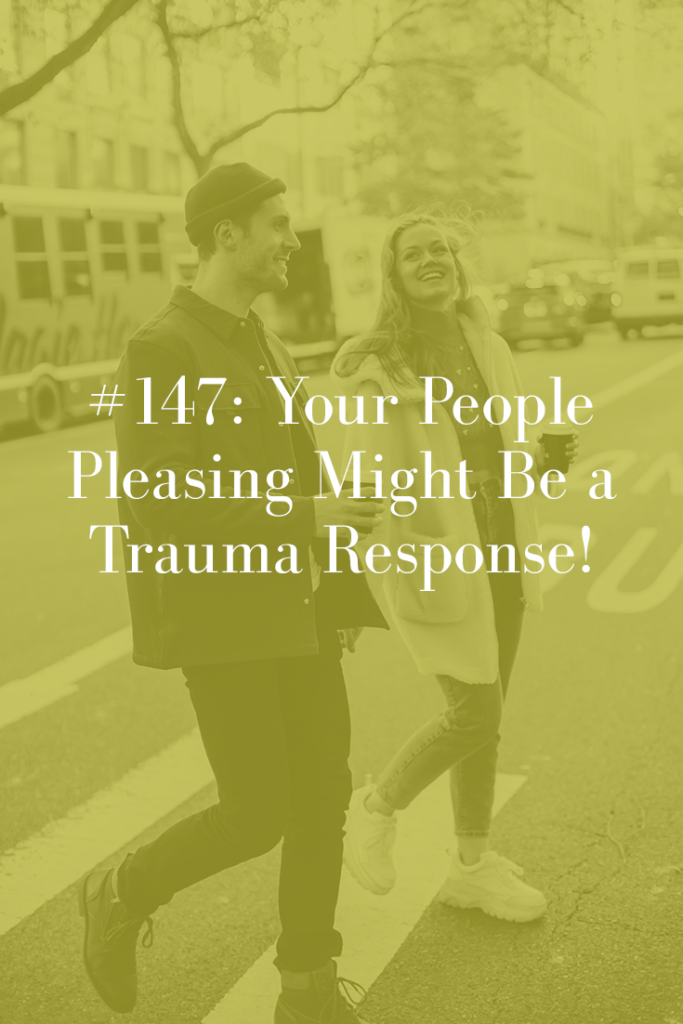
Prefer the more in-depth version? Click here!
I’m sure you’ve heard of the fight/flight/freeze response, but did you know that there’s also a fourth type of response called fawn which is like people pleasing on crack? Today I’m breaking down these four different conflict responses and then you’ll learn my two-step process to start taking control of your emotional reactions today!
What is Trauma?
Last week I talked about unhealed trauma. If you haven’t listened yet, please go back and check it out! For now, I want to quickly recap what I mean when I say “trauma.”
Trauma is sometimes hard to pinpoint (and it’s why you might not realize you’ve had it) because what’s traumatic to one person might not be traumatic to another. Trauma can come from neglect just as easily as it comes from overt physical or sexual abuse. What I find with many of my clients is that they don’t identify something as traumatic because objectively they think, “Well, I grew up in a good home… intact family, money, best schools… so there was no trauma.” Or, “I was raised by a single mom who had to work a lot, but I always knew I was loved.”
You’ve got to remember that this is your adult brain making sense of something! Your kid brain didn’t have this ability and not having a parent around or feeling that a parent wasn’t interested in you or didn’t engage with you can be traumatic to a kid.
Fight/Flight/Freeze Response
Now, everyone has the fight/flight/freeze response. It’s hardwired into our brains and doesn’t have to be about trauma; it gets triggered by anything that feels like a threat or conflict. The issue is how much you get triggered and for how long. That’s where trauma plays a role.
You might:
- Fight: go off on your dad and get angry
- Flee: remember that it’s really time to blow dry your hamster and that you’ve got to go home
- Freeze: say nothing and nod your head as he goes on and on. Or
- Fawn: you might try to please him and tell him tons of great things happening at work, lie and say you were promoted or take his advice and quit your job even though you love it.
Love the podcast? I’d be so grateful if you left a review! Just launch Apple’s Podcast app on your mobile device, search for the Relationships Made Easy podcast, and scroll down to rate and review!
So, let’s recap all four responses in a little more detail so you can more readily see where you might fit.
1. Maybe You’re a Fighter
In an argument or when you’re upset, you’re focused on arguing your point and being right. You dig your heels in and some people might even call you stubborn (sorry, I’d never call you that – I said, “some people”). You get defensive and stand by your beliefs first and foremost. It’s possible you’ve lost your temper before and then feel bad about it later but justify your reasons.
When your fighter characteristics are at their worst you can be explosive, controlling, entitled, demanding, perfectionist and even a bully. You try to control to connect and you use rage/anger to feel safe.
Some of the feelings you identify with most often may be anger, resentment, frustration or rage.
2. Or Maybe You Flee
This response can take many forms. The obvious ones are to physically leave the room or an argument because you’ve “had enough,” avoid conflict or fights altogether, or abandon your family or relationship.
When your flight characteristics are at their worst you can be obsessive, rushed, too busy, micromanaging, perfectionistic, panicked, or hooked on getting some adrenaline. You think you need to be perfect to connect and you use perfectionism to feel safe.
Some of the feelings you identify with often are: What feelings? You’re busy avoiding the ones you don’t like and figuring out ways not to feel uncomfortable!
3. Do You Freeze?
Do you mainly try to stay under the radar? Do you try to lay low so that whatever danger is around will pass on by? Consistent procrastination, certain types of avoidance and taking no actions are all things Freezers do. Maybe making no decision is how you make your decisions. You spin and spin on things that are bothering you but don’t take action to make changes. Instead, you get into “analysis paralysis” and stay stuck.
When your freeze characteristics are at their worst you can be isolating, incapable of making decisions, codependent, or a couch potato. You think there’s no way to connect and you hide to be safe.
Some of the feelings you identify with often are anxiety, depression, beating yourself up, overwhelm and regret.
4. Or Maybe You Fawn
In Pete Walker’s book he says, “Fawn types seek safety by merging with the wishes, needs and demands of others. They act as if they unconsciously believe that the price of admission to any relationship is the forfeiture of all their needs, rights, preferences and boundaries.”
When your fawning characteristics are at their worst you can be a doormat, perfectionistic, lose yourself, lost in serving others. You’re trying to merge to connect and you grovel to feel safe.
Some of the feelings you identify with often are guilt, shame, resentment, loneliness, disconnection, disassociation or numbness.
What to Do?
Step 1: Learn to Identify a Real Threat from a Perceived Threat
- Get mindful and in your moments. Practice, practice, practice.
- When you notice someone else’s anger, worry or upset, allow yourself to just be with it. Instead of fixing, focus on being. Practice not being triggered by these emotions from others. Practice allowing others to have their feelings without you intervening in any way. What is this discomfort telling you?
- What’s key about doing this is that you’re teaching yourself to identify consciously what’s a real threat and what’s a perceived threat.
Step 2: Have a Healthy Mix of the Four F’s
The goal is to have a healthy mix of the four F’s when you feel threatened or danger.
Let’s break down each one:
Fighter: Keep healthy boundaries, be assertive and ask for what you need
Flee/Flight: Learn when to disengage and have a healthy retreat when pushing forward will exacerbate the situation. You know how to persevere because you can get shit done yourself. You’re industrious and trust your own know-how.
Freeze: There’s an acute awareness and being in the moment here. When you’re in a healthy place you can take a moment to assess what’s really happening and think before you act. Walker describes a “poised readiness.”
Fawn: You’re able to listen, help and problem-solve. You lean into love and service without self-detriment. You’re fair and can express your point of view and needs.
RESOURCES
You Might Be Suffering from Unhealed Trauma
Boundaries: How to Make Them and How to Hold Them
How to Say “No” and Stick to It
Mindfulness Hacks: Reduce Stress and Anxiety
Mindfulness: 2 Hacks for Remembering to Be Mindful
RESEARCH












